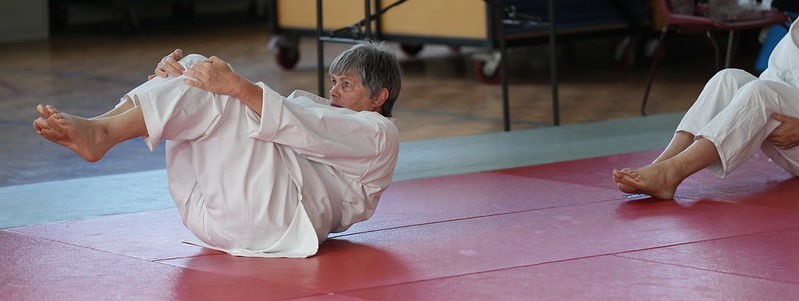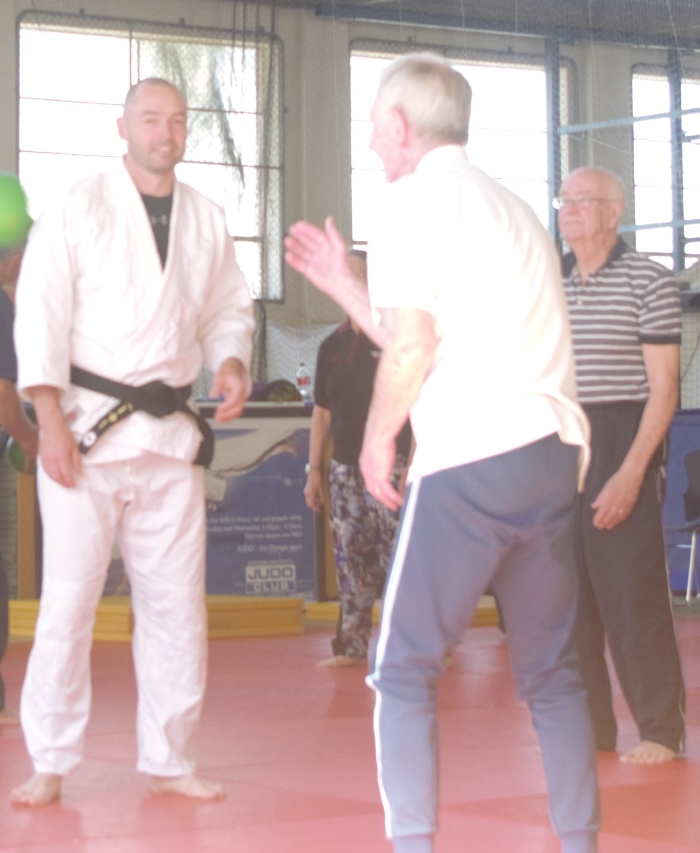Dynamic Balance for Life - 12 March 2024

What: Dynamic Balance for Life - A judo-based program to minimise harm from falling
Who: Adelaide University Judo Club
Target: Older adults between 66 & 87 years
When: Tuesday 12 March 2024, 11.15am-12.15pm with more sessions planned over 2024
Introduction to Landing Safely 60 minutes per session 12 session program
1st & 2nd sessions include an assessment of your ability to land safely and a report
Where: Adelaide University Judo Club 34 Phillips St, Thebarton SA 5031
(Entry from North car park)
How: Contact the Judo Club by phone: 0409 740 733 or Email: admin@aujudo.com
Register for Program 1 >>here or Phone/Email an Expression of Interest for the next programs over 2024
Programs are limited and bookings are essential
Cost: $195 for the Program (includes 3 month program membership to Judo Australia and personal insurance
On the day: Wear comfortable loose-fitting warm tracksuit or similar and bring a bottle of water
Martial arts - a new way to keep older South Australians out of hospital
Older South Australians are learning the skill of landing safely from a fall, to help prevent and treat frailty, helping reduce the chance of a person falling and ending up in hospital. These skills are inspired by the Japanese martial art of Judo.
Adelaide University Judo Club along with Researchers from the UofA, Basil Hetzel Institute at The Queen Elizabeth Hospital are trialling how learning Judo-based exercises and Judo-specific safe-landing techniques (called ‘ukemi’) can help people over 65 years increase their physical performance, mobility, and balance with the aim of minimising harm from a dangerous fall.
Simple judo-based skills learnt during this program will keep you steady on your feet and, if you do take a fall, you’ll have the knowledge how to land and get up safely.
The initial clinical study has shown significant improvement in balance, physical performance and mobility.

Find out more about the Study
Fifty per cent of older people who are frail will fall at least once per year—potentially ending up in hospital with a broken bone, leading to reduced independence and a lower quality of life.
Each day, 50 people over the age of 65 present to metropolitan hospitals due to falls in South Australia.
Dr Agathe Daria Jadczak is a Post-Doctoral Research Fellow with the University of Adelaide Geriatrics Training & Research With Aged Care Centre based at the Basil Hetzel Institute for Translational Health Research at The Queen Elizabeth Hospital. Her research focuses on various strategies how we can prevent, treat and delay frailty in older adults.
Frailty is an age-related syndrome which is characterised by a decline in physical function and performance. Frailty places an older person at an increased risk of adverse health outcomes. Some signs include slow waking speed, unintentional weight loss, feeling weak and exhausted and having low physical activity.
When older people are frail they are more likely to fall, end up in hospital, lose their independence and have a lower quality of life. We know that over 50% of older adults who are frail experience a fall each year and with an aging population, this is a growing problem.
But frailty is reversible. Exercise programs including aerobic, strength, balance and flexibility are actually the most effective way to prevent, treat, and delay frailty in older adults.
Here in Adelaide a program called Dynamic Balance for Life™ has been developed by the Adelaide University Judo Club (AUJC), which uses the sport of Judo to help older people to be best prepared in case they do fall.
Dr Meera Verma from AUJC says: “One of the most satisfying things for us as Judo coaches is that we can teach older adults who have difficulty going down to the ground when they come to us, to not only go up and down safely and confidently, but also learn to protect their head, hip and other joints during a simulated fall, by the end of the judo-based program”.
“It makes sense because if older people can learn how to fall safely, they can avoid injury or fractures, and not end up in hospital or have other negative health consequences” Dr Agathe Daria Jadczak says.

Life-changing!
In the words of a participant in the program “Recently I tripped as I was walking, falling forward on asphalt. And didn’t land on my face! A moment passed on the ground before I realised to my astonishment that I had unconsciously landed in a position I had learned and practised in Dynamic Balance, with my face and head a good 30 cm off the ground carefully protected by my forearms. I was fine. I got up, and carried on. Amazed.
Previously I had tripped while bushwalking, injuring my face, teeth and confidence pretty unpleasantly. I became fearful of hard surfaces after that, of falling and cracking my face again and only walked on the beach or with support for months.
Dynamic Balance has been truly transformative. Thank you so much.”
Here are two videos from participants at 6 months and 12 months after the introductory program:

Previous Program and Research
In 2021, the Adelaide University Judo Club in collaboration with the Dr Jadczak and the team of researchers at Adelaide University conducted an 8-week judo-based exercise study with older adults aged between 66 and 87. We found that our program was safe and it improved both, physical performance and balance. The participants that were pre-frail, meaning they were at higher risk of becoming frail in the near future, were actually those that improved the most.
We have published this research in the international Journal of Frailty and Ageing. We are very happy to see that some of our study participants continued with the Judo Club and have now been graded to a modified yellow belt and progressed to a modified orange belt in Judo.
Interested? Why not become involved!
This program is still being offered by the Adelaide University Judo Club, with the next one commencing on Tuesday 12th March 2024. And the Research Team is now looking into expanding the study.
So if you are interested in being involved, please contact the Judo Club by Phone: 0409740733 or Email: admin@aujudo.com
Sign up for the newsletter!
Subscribe to our monthly newsletter to receive news, information and events for the community sector in SA




